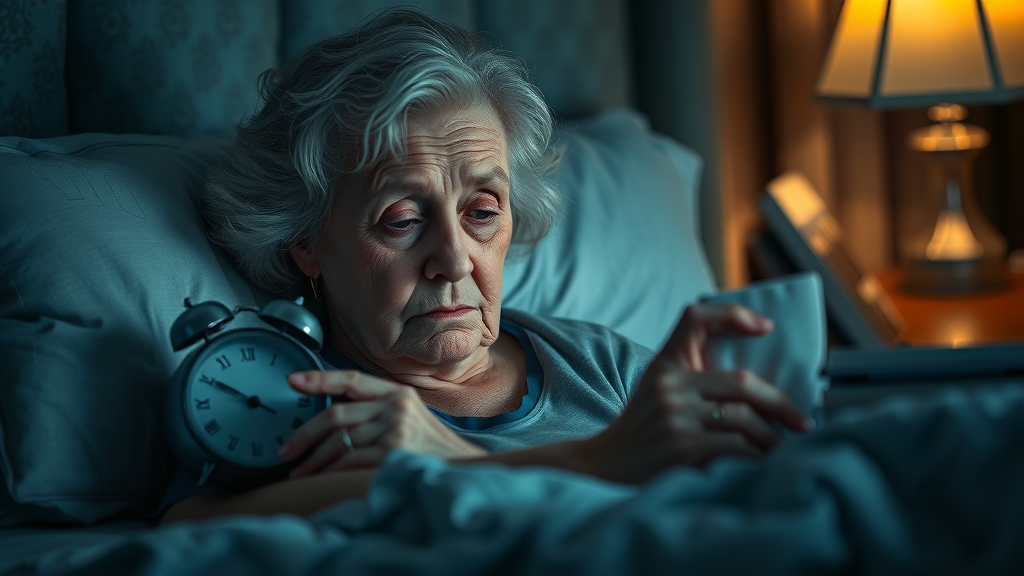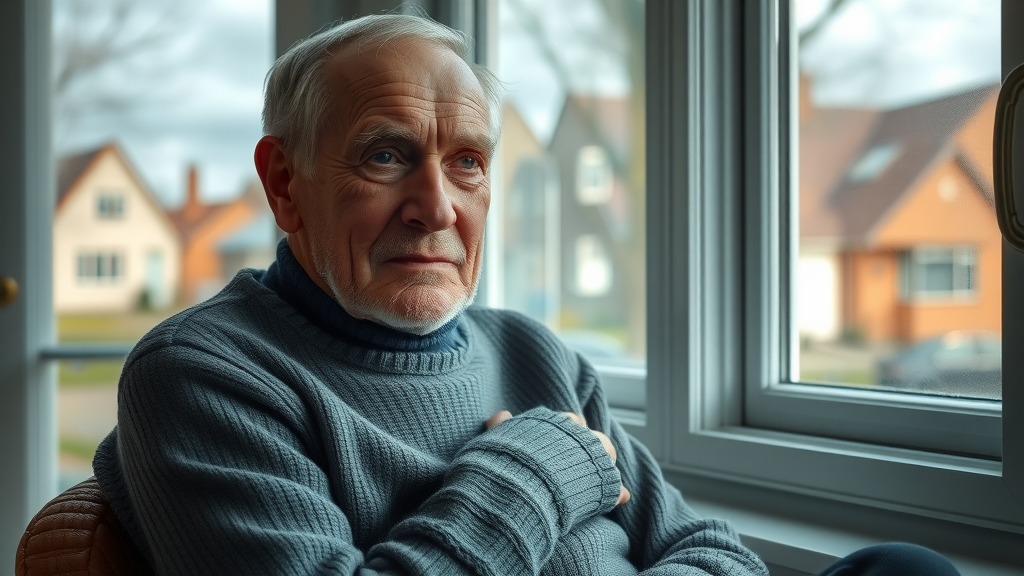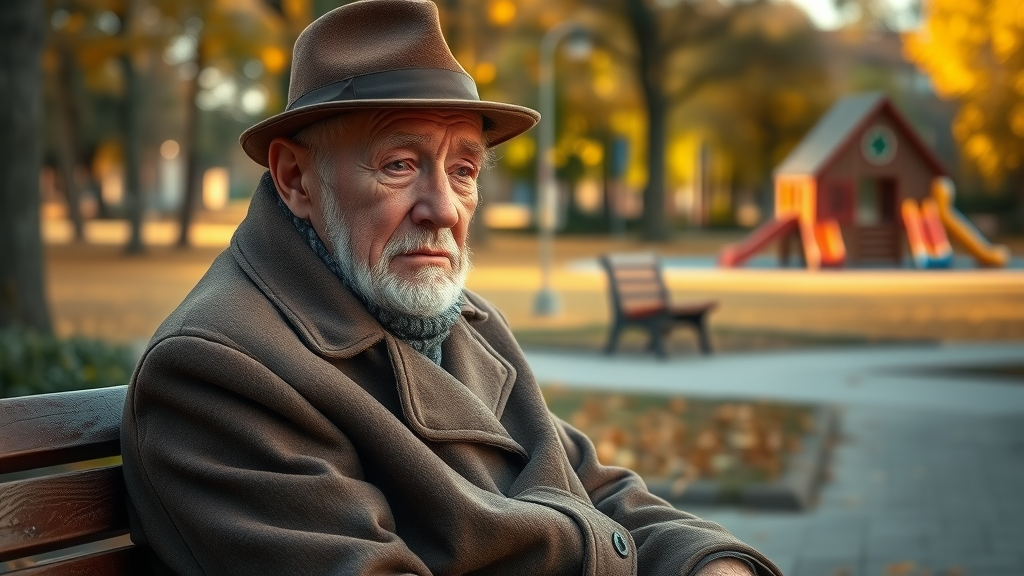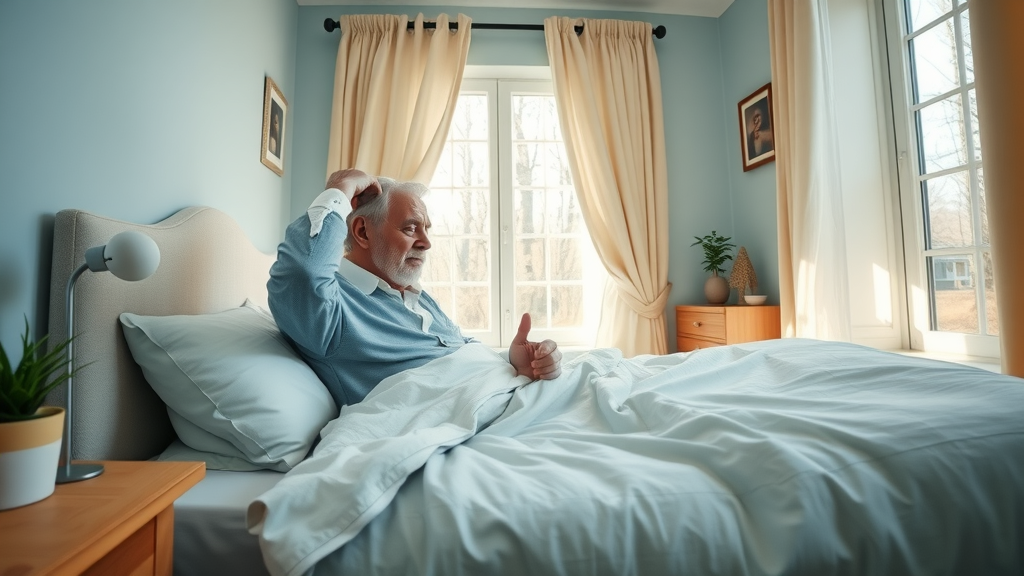Confronting the Reality: How Depression and Sleep in Elderly Shape Life’s Final Chapters
Did you know up to 50% of older adults suffer from sleep disturbances, which doubles their risk for depression?
Imagine your golden years being defined not by relaxation and joy, but by restless nights and low mood. For many older adults, this is the reality. Depression and sleep in elderly are deeply intertwined—creating a cycle that often goes unrecognized. As the population ages in the United States and worldwide, public health concerns about mental health in seniors are rising. Yet, conversations about sleep and mental health in the elderly remain muted, with societal expectations too often dismissing their struggles as "just a part of getting old."

Elderly couple supporting each other on a cozy living room sofa during late evening.
Yet, sleep disturbance and depression in older adults are not separate problems—they fuel a dangerous spiral. Disrupted sleep increases the risk for depression and vice versa, chipping away at a person’s quality of life. Left unchecked, this cycle contributes to greater physical decline, social isolation, and lost independence. It’s time we break this silence and demand better for our elders.
An Opinionated Lens: Challenging Society’s Silence on Depression and Sleep in Elderly
There is an unfortunate stigma surrounding both depression in older adults and their sleep complaints. Conversations about the mental health of our elder community are still rare—often overshadowed by misconceptions that poor sleep or persistent sadness are just inevitable aspects of aging. This silence is harmful. When families, communities, and even healthcare providers dismiss sleep and mood issues, they inadvertently strip older people of their right to a joyful, healthy life in their later years. We must confront this cultural blind spot, acknowledging that mental health and sleep quality are essential for dignified aging and that neglecting these issues is a public health crisis in the making.
A Startling Statistic: Sleep Duration and Mental Health in Older Adults
Research consistently shows that about half of older adults experience sleep disturbances—and those suffering from inadequate or short sleep duration are at a distinctly higher risk for depression in older adults. Longitudinal studies reveal that persistent sleep issues often precede new depressive symptoms , suggesting a domino effect that can devastate overall quality of life. These findings underscore the pressing need for early intervention and societal recognition of the deep connection between sleep and mental health in elderly populations.
What You Need to Know about Depression and Sleep in Elderly
Prevalence of depressive disorders and sleep disturbance in older adults
Risk factors unique to the aging population
The bi-directional impact of depressive symptoms and sleep quality
Warning signs, and effective approaches to break the cycle

Thoughtful elderly woman lying awake, reflecting the struggle between sleep and depression in older adults.
When discussing depression and sleep in elderly, it’s crucial to acknowledge just how pervasive these coexisting issues are. Nearly one third of older adults will experience either a depressive disorder or significant sleep disturbance. Insomnia symptoms, short sleep, and poor sleep quality are notably higher among seniors compared to their younger counterparts. The risk factors are multifaceted—ranging from biological age-related changes and chronic illness to life transitions, social loss, and even the medications intended to help. Understanding this bi-directional impact is vital : not only does depression disrupt sleep, but poor sleep further fuels depressive symptoms, setting up a relentless cycle.
Spotting early warning signs —such as daytime fatigue, mood swings, and cognitive decline—can empower families and providers to intervene in time. Fortunately, evidence-based approaches show that this cycle can be broken through targeted interventions and strong support networks. This provides hope for both older adults and those who care for them, showing that improved sleep and mood is possible at any age.
Understanding Depression and Sleep in Elderly: A Deep Dive
Decoding Sleep Duration and Sleep Quality in Older People
Sleep changes dramatically as we age. Older adults, including people over 65, commonly report lighter and more fragmented sleep, increased nighttime awakenings, and spending less time in restorative deep sleep. Although seven to eight hours is considered optimal sleep duration for most older people, biological aging, chronic health problems, and lifestyle factors often reduce actual sleep time. These changes in sleep architecture make seniors especially prone to sleep disturbance, insomnia symptoms, and ultimately, increased risk for depression.
Sleep quality matters as much as sleep duration. Waking up feeling unrefreshed, or experiencing frequent disruptions, disproportionately affects older individuals. Poor sleep quality has been linked with greater rates of depressive symptoms, reduced cognitive function, and a higher prevalence of chronic health conditions, forming a central pillar in the quality of life equation for elderly populations.
Defining Depression in Older Adults: Symptoms, Impact, and Stigma
Depression in older adults often manifests differently than in younger people. While classic symptoms—like persistent sadness and loss of interest—still apply, older people may also experience unexplained aches, withdrawal from activities, and changes in sleep patterns. This divergence can lead to missed diagnoses, especially as ageism and stigma silence those most in need of help. The impact is staggering: from increased risk of dementia and heart disease to worsening of existing conditions. There's an urgent need to recognize depression in older adults as a medical condition, not a normal part of aging.

Elderly man reflecting on life and mental health during a sleepless morning.
The Overlap: How Insomnia Symptoms and Depressive Symptoms Interact
Insomnia and depression in elderly people are closely intertwined. Persistent insomnia symptoms—trouble falling asleep, staying asleep, or waking early—often lead to daytime fatigue, poor mood, and disengagement. These, in turn, can fuel or worsen depressive symptoms, creating a self-perpetuating cycle. Notably, research shows that tackling one problem (such as improving sleep quality) often yields positive effects in the other domain, highlighting the importance of integrated care approaches for the aging.
Comparing Sleep Quality, Depression Prevalence, and Quality of Life Among Different Elderly Age Groups |
|||
Age Group |
Average Sleep Quality Score |
Prevalence of Depression (%) |
Reported Quality of Life |
|---|---|---|---|
65-74 |
6.5/10 |
16% |
Moderate-High |
75-84 |
5.8/10 |
22% |
Moderate |
85+ |
5.1/10 |
29% |
Low-Moderate |
As shown above, advancing age often correlates with declining sleep quality, higher prevalence of depression, and deteriorating quality of life—underscoring the importance of early intervention.
Why Is the Connection Between Depression and Sleep in Elderly So Vicious?
Major Depressive Disorder and Persistent Sleep Disturbance in Older Adults
Older adults with major depressive disorder are at an increased risk for persistent sleep disturbances. Chronic insomnia and poor sleep quality don’t simply coexist with depression—they can directly worsen the intensity and duration of depressive symptoms. Conversely, unresolved depression makes sleep disorders increasingly difficult to treat. Without intervention, this cycle erodes both physical and mental health, with consequences including increased hospitalization, greater dependence, and even mortality. Breaking this pattern requires both awareness and access to treatment.
Longitudinal Studies: The Domino Effect of Poor Sleep on Mental Health
Landmark longitudinal studies indicate that sleep problems frequently precede major mood disorders in the elderly. For example, older people with chronic sleep disturbance are at significantly higher risk for the onset of new depressive symptoms within a matter of months. This domino effect extends beyond mental health—amplifying risk for medical complications, cognitive impairment, and compromised quality of life. These findings challenge the view that disturbed sleep is merely an aftereffect of depression, proving it can also be an early warning sign and causal factor.

The upshot? If we want to enhance public and mental health in older adults, sleep improvement and depression prevention efforts must go hand in hand—addressing these issues as two sides of the same coin.
Common Sleep Issues in Older Adults: Breaking Down the Risk Factors
Insomnia symptoms and their prevalence in older people
Sleep duration variations and biological age
Major risk factors for depressive disorder in older age
Sleep Apnea, Restless Leg Syndrome, and Other Sleep Disturbances
Insomnia is not the only sleep disorder faced by older adults—sleep apnea, restless leg syndrome, and periodic limb movements also increase with age. These conditions lead to repeated arousals and short sleep duration, amplifying fatigue and mood disturbance. Medical comorbidities, such as heart disease, diabetes, and chronic pain, further complicate sleep patterns, creating barriers to restorative rest.
"Inadequate sleep is both a symptom and a cause—fueling a dangerous downward spiral for older adults."
Video explainer: Visualizing How Depression and Poor Sleep Interact in Elderly People
Recognizing the unique risk factors in older people—like retirement, bereavement, changes in circadian rhythm, chronic illnesses, and side effects from multiple prescriptions—is essential for tailored interventions. By addressing the specific causes and types of sleep disturbance, healthcare providers can develop targeted strategies to help break the cycle of insomnia and depression in older populations.
The Impact of Depression and Sleep in Elderly on Quality of Life

Physical Health Consequences: From Fatigue to Increased Mortality
Physical ramifications of the depression and sleep in elderly cycle are sweeping. Daytime sleepiness and chronic fatigue raise fall risk and may lead to accidents, while persistent disturbed sleep is strongly linked to cardiovascular issues, poor immune function, and even increased mortality. These threats are compounded by the presence of depressive symptoms, which worsen adherence to medication, erode appetite, and create barriers to rehabilitation.
Daily Living Challenges: Cognitive Decline, Mood, and Social Isolation
The toll of chronic sleep deprivation and low mood on quality of life is devastating for older adults. Impaired memory, slowed thinking, irritability, and greater susceptibility to dementia all threaten independent living. Mood changes heighten the risk for social withdrawal, amplifying isolation—a known risk factor for both depression in older adults and further sleep disturbance. Together, these issues form one of the greatest challenges to healthy aging.
Quality of life implications for older adults
Barriers to recognizing depressive symptoms in older people

Regrettably, age-related stereotypes and lack of training among providers can leave depressive symptoms and sleep disorders in seniors undiagnosed and untreated. Breaking this pattern is vital if we are to preserve the dignity and vibrancy of our older population.
Risk Factors Amplifying Depression and Sleep Challenges in Older Adults
Social Isolation, Chronic Disease, and Major Life Transitions
Major life changes —retirement, bereavement, loss of independence—can be powerful risk factors for both sleep disorders and depression in older adults. Add in chronic medical conditions such as diabetes, arthritis, and neurodegenerative disorders, and both mood and sleep quality can plummet. Social isolation compounds these risks, making the prospect of living well feel out of reach for many seniors. The interplay between multiple risk factors can make both assessment and treatment more complex, but also highlights potential points for intervention.
Prescription Medications and Co-existing Health Conditions
Elderly people are often prescribed multiple medications, many of which can interfere with sleep architecture and impact mood. Examples include certain blood pressure meds, corticosteroids, and even some sleep meds. Co-existing conditions further strain the delicate sleep and mental health balance, increasing the risk for depression and sleep disturbance. Coordinated healthcare that considers the whole individual, rather than isolated symptoms, is vital for improving outcomes for the elderly.
"It’s time society stops dismissing sleep complaints among older adults as ‘just part of aging.’"

How to Break the Depression and Sleep in Elderly Cycle: Evidence-Based Solutions
Personalized Sleep Hygiene and Routine Improvements
Improvements in sleep hygiene can help break the depression and sleep in elderly cycle. This includes establishing a consistent sleep schedule, creating a calm and dark environment, limiting screen time before bed, and incorporating relaxing pre-sleep routines. Regular daytime activity, exposure to natural light, and mindful reduction of caffeine or late-night snacks can all bolster sleep quality. Such personalized interventions, tailored for older adults, can yield significant improvements in both mood and overall health.
Cognitive Behavioral Therapy and Mindfulness Approaches for Depressive Symptom Relief
Psychotherapeutic interventions, especially cognitive behavioral therapy (CBT) tailored for insomnia or depression, show robust effectiveness. CBT for insomnia helps older people reframe negative sleep beliefs and adopt more adaptive behaviors. Mindfulness, meditation, and gentle movement practices (like yoga or tai chi) further support sleep and mood, giving seniors practical tools to manage stress and improve daily functioning.

Medical Treatments: Evaluating Medications for Major Depressive Disorder and Insomnia
For many older adults, targeted use of medication may be necessary, particularly with major depressive disorder or severe sleep disorder. Antidepressants, selective sleep meds, and therapy for co-existing physical conditions should always be prescribed under the careful guidance of a healthcare provider, considering the increased sensitivity and side effect risk in this age group. Regular medication review, combined with non-drug approaches, delivers the best outcomes for patients navigating depression and sleep disturbance.
Community and Family Support Initiatives
Encouraging Professional Help: When and How?
Lastly, a robust support network—including family, friends, support groups, and healthcare professionals—remains the cornerstone in breaking the cycle. Early and open encouragement to seek professional help is vital: warning signs should never be ignored, and timely intervention saves lives.
Editorial Perspective: Shifting the Narrative on Depression and Sleep in Elderly
"Older adults deserve dignity, restorative sleep, and freedom from depression—not dismissiveness."

What Policymakers and Healthcare Providers Need to Change Now
It’s time for public health leaders and medical professionals to take decisive action. Policy must prioritize integrated mental health and sleep services for older people, banish dismissive attitudes, and fund routine screening for both depression and sleep disorders in primary care. Training healthcare providers to recognize the nuanced symptoms of both, and incentivizing research into new treatments, will shape a society that honors the needs of its elders. Ultimately, a compassionate and proactive approach is essential —shifting the narrative from passive acceptance to active support and intervention.
People Also Ask: Answering Key Questions on Depression and Sleep in Elderly
What is the most common sleep problem in the elderly?
Insomnia is the most prevalent sleep disturbance in older adults, marked by trouble falling asleep, staying asleep, or waking too early. It often goes hand-in-hand with depressive symptoms, intensifying overall health risks. Early recognition and targeted intervention can significantly improve sleep and mood in this population.
How much sleep does an 80 year old need?
Generally, older adults—including those aged 80 and above—require 7-8 hours of sleep per night to maintain physical and mental health. Yet, sleep duration may decrease due to chronic illness or depressive symptoms, so individualized assessment and support are key to optimizing sleep in advanced age.
Why is my 80 year old not sleeping well?
Several risk factors—including depression, chronic medical conditions, medications, and lifestyle habits—can disrupt sleep quality in elderly people, contributing to persistent sleep disturbance. Assessing these factors with a healthcare provider can point the way to interventions that offer meaningful relief.
What are the signs and symptoms of inadequate sleep in the elderly?
Common warning signs include daytime fatigue, irritability, difficulty concentrating, mood changes, and increased risk for depression. If persistent, these symptoms may indicate deeper depressive disorder or health issues, making early evaluation and treatment crucial.

Practical List: Tips for Enhancing Sleep and Mood in Older Adults
Maintain a consistent sleep schedule for optimal sleep duration
Create a restful sleep environment to boost sleep quality
Limit caffeine and avoid large meals before bedtime
Encourage social and physical activity during the day
Address underlying depressive symptoms with professional guidance

Frequently Asked Questions on Depression and Sleep in Elderly
Are sleep disturbances in older adults always linked to depression?
Not always. While many sleep disturbances are connected to mood disorders, medical conditions and aging itself can independently affect sleep. However, any persistent change in sleep should prompt discussion with a healthcare professional, as untreated issues can quickly escalate into depression and other serious complications.
Can sleep quality improve once depressive symptoms are treated?
Absolutely. Treating depressive symptoms often leads to improved sleep quality and duration in older people. Cognitive behavioral therapy and medical management are effective at addressing both conditions simultaneously, greatly enhancing quality of life.
What role does medication play in managing sleep and depressive disorder in elderly people?
Medications can be very helpful when prescribed judiciously—especially in cases of major depressive disorder or severe insomnia. However, the benefits and risks must be weighed carefully in older adults, as they are more sensitive to side effects and drug interactions. Always follow a healthcare provider’s guidance on medication use.
Final Thoughts: Urging Action to Break the Depression and Sleep in Elderly Cycle
"Awareness is the first step—advocacy and compassionate intervention must follow."
Recognize depression and sleep disruptions as treatable in older adults
Foster support at all levels—family, community, healthcare
Challenge stigma: open dialogue about mental health and sleep
Pursue evidence-based solutions and never dismiss ongoing symptoms
Take Immediate Action: Help Break the Chain of Depression and Sleep in Elderly
Advocate for systemic changes in elder care addressing senior mental health and sleep
Understanding the intricate relationship between depression and sleep disturbances in the elderly is crucial for improving their quality of life. The article “Depression and Sleep in Elderly: Break the Vicious Cycle Now” delves into this topic, highlighting the bidirectional impact these conditions have on each other.
For a comprehensive overview of how sleep quality correlates with depression in older adults, the meta-analysis titled “Depression and sleep quality in older adults: a meta-analysis” offers valuable insights. This study synthesizes data from multiple sources to elucidate the significant association between poor sleep and depressive symptoms in the elderly. ( pubmed.ncbi.nlm.nih.gov )
Additionally, the research article “Sleep Disturbance and Depression Recurrence in Community-Dwelling Older Adults: A Prospective Study” provides evidence on how sleep disturbances can predict the recurrence of depression among older individuals living in the community. This study underscores the importance of monitoring and addressing sleep issues to prevent depressive episodes. ( pmc.ncbi.nlm.nih.gov )
If you’re serious about understanding and addressing the complex interplay between sleep and depression in the elderly, these resources will offer you a deeper and more nuanced perspective.
 Add Element
Add Element  Add Row
Add Row 




Write A Comment